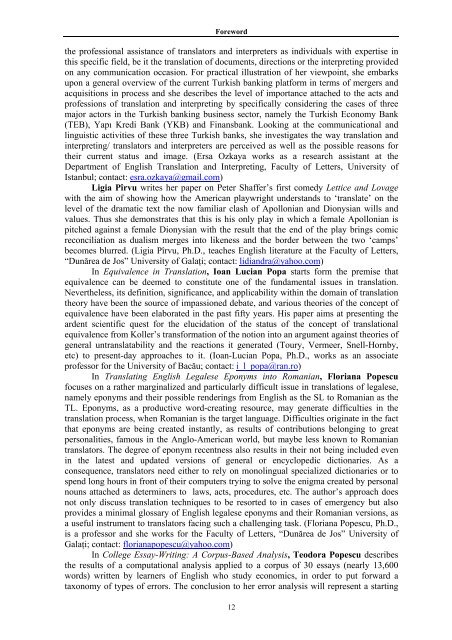translation studies - Facultatea de Litere - Dunarea de Jos
translation studies - Facultatea de Litere - Dunarea de Jos
translation studies - Facultatea de Litere - Dunarea de Jos
You also want an ePaper? Increase the reach of your titles
YUMPU automatically turns print PDFs into web optimized ePapers that Google loves.
Foreword<br />
the professional assistance of translators and interpreters as individuals with expertise in<br />
this specific field, be it the <strong>translation</strong> of documents, directions or the interpreting provi<strong>de</strong>d<br />
on any communication occasion. For practical illustration of her viewpoint, she embarks<br />
upon a general overview of the current Turkish banking platform in terms of mergers and<br />
acquisitions in process and she <strong>de</strong>scribes the level of importance attached to the acts and<br />
professions of <strong>translation</strong> and interpreting by specifically consi<strong>de</strong>ring the cases of three<br />
major actors in the Turkish banking business sector, namely the Turkish Economy Bank<br />
(TEB), Yapı Kredi Bank (YKB) and Finansbank. Looking at the communicational and<br />
linguistic activities of these three Turkish banks, she investigates the way <strong>translation</strong> and<br />
interpreting/ translators and interpreters are perceived as well as the possible reasons for<br />
their current status and image. (Ersa Ozkaya works as a research assistant at the<br />
Department of English Translation and Interpreting, Faculty of Letters, University of<br />
Istanbul; contact: esra.ozkaya@gmail.com)<br />
Ligia Pîrvu writes her paper on Peter Shaffer’s first comedy Lettice and Lovage<br />
with the aim of showing how the American playwright un<strong>de</strong>rstands to ‘translate’ on the<br />
level of the dramatic text the now familiar clash of Apollonian and Dionysian wills and<br />
values. Thus she <strong>de</strong>monstrates that this is his only play in which a female Apollonian is<br />
pitched against a female Dionysian with the result that the end of the play brings comic<br />
reconciliation as dualism merges into likeness and the bor<strong>de</strong>r between the two ‘camps’<br />
becomes blurred. (Ligia Pîrvu, Ph.D., teaches English literature at the Faculty of Letters,<br />
“Dunărea <strong>de</strong> <strong>Jos</strong>” University of Galaţi; contact: lidiandra@yahoo.com)<br />
In Equivalence in Translation, Ioan Lucian Popa starts form the premise that<br />
equivalence can be <strong>de</strong>emed to constitute one of the fundamental issues in <strong>translation</strong>.<br />
Nevertheless, its <strong>de</strong>finition, significance, and applicability within the domain of <strong>translation</strong><br />
theory have been the source of impassioned <strong>de</strong>bate, and various theories of the concept of<br />
equivalence have been elaborated in the past fifty years. His paper aims at presenting the<br />
ar<strong>de</strong>nt scientific quest for the elucidation of the status of the concept of <strong>translation</strong>al<br />
equivalence from Koller’s transformation of the notion into an argument against theories of<br />
general untranslatability and the reactions it generated (Toury, Vermeer, Snell-Hornby,<br />
etc) to present-day approaches to it. (Ioan-Lucian Popa, Ph.D., works as an associate<br />
professor for the University of Bacău; contact: i_l_popa@ran.ro)<br />
In Translating English Legalese Eponyms into Romanian, Floriana Popescu<br />
focuses on a rather marginalized and particularly difficult issue in <strong>translation</strong>s of legalese,<br />
namely eponyms and their possible ren<strong>de</strong>rings from English as the SL to Romanian as the<br />
TL. Eponyms, as a productive word-creating resource, may generate difficulties in the<br />
<strong>translation</strong> process, when Romanian is the target language. Difficulties originate in the fact<br />
that eponyms are being created instantly, as results of contributions belonging to great<br />
personalities, famous in the Anglo-American world, but maybe less known to Romanian<br />
translators. The <strong>de</strong>gree of eponym recentness also results in their not being inclu<strong>de</strong>d even<br />
in the latest and updated versions of general or encyclopedic dictionaries. As a<br />
consequence, translators need either to rely on monolingual specialized dictionaries or to<br />
spend long hours in front of their computers trying to solve the enigma created by personal<br />
nouns attached as <strong>de</strong>terminers to laws, acts, procedures, etc. The author’s approach does<br />
not only discuss <strong>translation</strong> techniques to be resorted to in cases of emergency but also<br />
provi<strong>de</strong>s a minimal glossary of English legalese eponyms and their Romanian versions, as<br />
a useful instrument to translators facing such a challenging task. (Floriana Popescu, Ph.D.,<br />
is a professor and she works for the Faculty of Letters, “Dunărea <strong>de</strong> <strong>Jos</strong>” University of<br />
Galaţi; contact: florianapopescu@yahoo.com)<br />
In College Essay-Writing: A Corpus-Based Analysis, Teodora Popescu <strong>de</strong>scribes<br />
the results of a computational analysis applied to a corpus of 30 essays (nearly 13,600<br />
words) written by learners of English who study economics, in or<strong>de</strong>r to put forward a<br />
taxonomy of types of errors. The conclusion to her error analysis will represent a starting<br />
12












